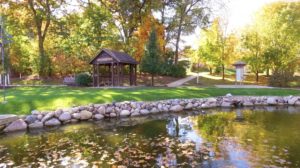
The University of Washington’s College of the Environment (UWCE) is on a mission to prove that green space is a valuable currency for human health. On its website, “Green Cities: Good Health,” the college provides scientific evidence of a relationship between urban forestry and green spaces and the health of people who live in those areas.
We’ll give you an overview of the impressive findings discussed on the website, but also recommend that you pay it a visit when the next rainy day has you looking for an indoor activity.
Green cures the blues
In explaining the rationale behind its website, the college wrote, “Nearly 40 years of research shows that the experience of nature is profoundly important to human functioning, health, and well-being.” That is very good news for the 80 percent of U.S. citizens and 50 percent of the world population that live in urban areas.
Here are a few of the many compelling examples of how green is good for what ails you:
- Dementia patients who have access to gardens are less likely to display aggression or experience injuries, sleep better, and are less agitated.
- Attention Deficit Disorder (A.D.D) symptoms in children can be reduced through play activities in green settings. This “green time” can be an effective supplement to medicine and behavioral treatments.
- Neuroscientists discovered that the constant stimuli of city life can cause the brain to suffer memory loss and reduced self-control. Even brief glimpses of nature can give the urban-dwelling brain a respite from complex thinking.
- Viewing nature can ease pain and encourage healing.
- Having plants within eyesight of workstations has been reported to improve employee morale, decrease absenteeism and increase work efficiency.
A second green champion
Five states away, a research lab shares UWCE’s commitment to educating the public, businesses and governments on the importance of embracing nature. The Landscape and Human Health Laboratory at the University of Illinois at Urbana-Champaign focuses on the relationship between human health and green space.
The website provides downloadable reports on many research studies. One seemed especially intriguing: “Ecological restoration volunteers: the benefits of participation.” While most studies by the laboratory evaluate the positive benefits of viewing plants, this study discusses what happened when volunteers worked to restore natural vegetation.
Mother Nature as therapist
The study evaluated the satisfaction reported by volunteers who restored prairie in the Chicago area. Almost all natural prairies in the central U.S. have been devoured by farming and urban development. Without the work of restoration volunteers, native habitats would be lost forever. Volunteers reported satisfaction in making a difference and accomplishing something important. There was also a feeling of community, because restoring natural habitat is an intense and coordinated group effort.
We encourage you to visit these two websites for inspiration and information, as both universities post research results on a continuing basis. For inspiration closer to home, just throw open the curtains and enjoy Meth-Wick’s beautiful view, or lace up the walking shoes and hit our campus trail.